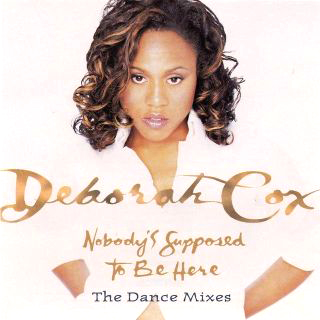
"The Best Things in Life Are Free" is a duet between American singers Luther Vandross and Janet Jackson, recorded for the Jimmy Jam and Terry Lewis produced soundtrack to the 1992 American film Mo' Money, starring Damon Wayans. The song was composed by Jam, Lewis, Michael Bivins, Ronnie DeVoe, Harry Wayne Casey and Richard Finch. The song was released as the soundtrack's lead single on May 12, 1992, by Perspective Records and A&M Records. Additionally, the song was remixed by David Morales, Frankie Knuckles, and CJ Mackintosh. The duet became a major hit in several countries, peaking at number two in Australia and the United Kingdom, number six in Ireland and New Zealand, number eight in Canada and Germany, and number 10 in the United States. Its music video was directed by Paris Barclay, but didn't feature Vandross and Jackson. The song was nominated for the Grammy Award for Best R&B Performance by a Duo or Group with Vocals.

"Causing a Commotion" is a song by American singer Madonna from the soundtrack album to the 1987 film Who's That Girl. It was released as the album's second single on August 25, 1987, by Sire Records. Its Silver Screen Single Mix later appeared on the EP The Holiday Collection (1991). Written and produced by Madonna and Stephen Bray, the song was inspired by her relationship with then-husband Sean Penn, and his abusive and violent nature. Containing a dance-oriented, up-tempo groove, the song begins with the chorus and is accompanied by a four-note descending bassline and staccato chords in the verses.

"Angel" is a song by American singer Madonna from her second studio album Like a Virgin (1984). It was released on April 10, 1985, by Sire Records as the album's third single. Written by Madonna and Steve Bray, it was one of the first songs developed for the project and, according to Madonna, was inspired by a girl who is saved by an angel, and she falls in love with him. "Angel" was released as a 12-inch single with "Into the Groove" in some countries and charted likewise. A music video was not filmed for "Angel", and instead, a promotional clip comprising segments of her previous videos was released in the United Kingdom.

"What a Girl Wants" is a song recorded by American singer Christina Aguilera for her self-titled debut album (1999). Written by Shelly Peiken and Guy Roche as "What a Girl Needs", the song was originally released by French singer Ophélie Winter in 1998. On her album Privacy the song appeared in English and French. The French version was released as a single two years later. In the meantime, the song was pitched by Peiken and Roche to RCA Records. Following a change of the song title to "What a Girl Wants", it was recorded by Aguilera for her eponymous debut album.

"Dreams" is a song by the British-American rock band Fleetwood Mac, written and sung by Stevie Nicks for the band's eleventh studio album, Rumours (1977). In the United States, "Dreams" was released as the second single from Rumours in March 1977, while in the United Kingdom, the song was released as the third single in June 1977. A stage performance of "Dreams" was used as the promotional music video.

"I Wanna Be With You" is a song by American singer Mandy Moore. It was released on April 3, 2000, as the lead single from Moore's reissue of the same name (2000) and as a single from the soundtrack to the 2000 film Center Stage. The song received positive reviews from critics. It peaked at number 24 in the United States Billboard Hot 100, becoming Moore's first and only top 30 single in the US. The song also peaked at number 13 in Australia and was certified gold by the Australian Recording Industry Association (ARIA). The music video for the song, directed by Nigel Dick, shows Moore singing the song to her love interest in a dance studio.

"Some Girls" is a song by English singer Rachel Stevens from the 2004 reissue of her debut studio album, Funky Dory (2003). It was written by Richard X and Hannah Robinson, and produced by the former, with additional production from Pete Hoffman. It was also included on Stevens' second studio album, Come and Get It (2005). The song's music features a schaffel beat influenced by glam rock, and its lyrics describe a pop singer who performs sexual favours in her efforts to achieve stardom.

"Strict Machine" is an electronic dance song written by British electronic music duo Goldfrapp and Nick Batt for Goldfrapp's second studio album, Black Cherry (2003). It was produced by Goldfrapp and describes laboratory rats in neuroscience experiments. Alison Goldfrapp read in a newspaper about experiments in which scientists stimulated rats' brains so that the rats would feel joy when following commands. She was inspired to write "Strict Machine" based on images of the experiment and "more human aspects of machines and sex and control". Actress Gwendoline Christie features on the record sleeve disguised in a rabbit mask.

"Sidewalk Talk" is a song by American record producer John "Jellybean" Benitez from his first extended play, Wotupski!?! (1984). It was released on October 21, 1984, by EMI Records as the first single from the EP. The song was written by Madonna and produced by Benitez. They had initially met in 1983 and Benitez worked as a producer on Madonna's self-titled debut album. When he started work on his debut EP, Wotupski!?!, Madonna wrote "Sidewalk Talk" for him. The song features bass and electric guitars, synthesizers, piano, and drums. Lead vocals are by Catherine Buchanan with additional chorus vocals by Madonna.

"Chorus" is a song by English synth-pop duo Erasure, released in June 1991 as the first single from their fifth studio album of the same name (1991). Produced by Martyn Phillips and written by Erasure members Vince Clarke and Andy Bell, the song features Clarke's electronic soundscapes and Phillips' computerised production. The single was released by Mute Records in the United Kingdom and Sire Records in the United States. It peaked at number three in both Denmark and the UK while reaching number four in Ireland. In the US, it peaked at number 83 on the Billboard Hot 100 and number four on the Billboard Modern Rock Tracks chart.

"Nobody's Supposed to Be Here" is a song by Canadian recording artist Deborah Cox, released as the lead single from her second studio album, One Wish (1998). Written by Montell Jordan and its producer, Anthony "Shep" Crawford, the song was released on the same day as the album, on September 15, 1998, by Arista Records. It is Cox's most successful song, peaking at number two on the Billboard Hot 100 for eight weeks and spending a then-record 14 weeks at number one on the Hot R&B Singles & Tracks chart. In 2017, Billboard ranked the song at number five on its "Greatest of All Time Hot R&B/Hip-Hop Songs" chart.

"Intuition" is a song by American singer Jewel from her fifth studio album, 0304 (2003). The song was written and produced by Jewel and Lester Mendez. It was released on April 7, 2003, as the album's lead single. Following the club success of "Serve the Ego", Jewel shifted to a more pop-oriented sound with the release of "Intuition". The song, which strays from her usual folk style with simple acoustic guitar instrumentation, starts off with a French accordion and then experiments with dance-oriented beats with subtle urban influences, using synthesizers. The song's lyrics contain a number of references to popular culture, including namechecking celebrities such as singer and actress Jennifer Lopez, model Kate Moss, actor Charlie Sheen, magazines, film culture, and commercialism.

"Touch Me" is a song by Portuguese house music producer Rui da Silva and British singer-songwriter Cassandra Fox. The song began to gain popularity after being played in dance clubs in October 2000. The track was originally scheduled for release in December 2000, but it was postponed to avoid competing with songs that would experience sales surges resulting from the Christmas holiday period. It was eventually released on 1 January 2001.

"I Think We're Alone Now" is a song written and composed by Ritchie Cordell that was first recorded by Tommy James and the Shondells. It was a major hit for the group, reaching number 4 on the US Hot 100 in April 1967. It finished at No. 12 on Billboard magazine's year-end singles chart for 1967.

"Killer" is a song by British DJ and record producer Adamski. It was written by Adamski and British singer-songwriter Seal, who also provided vocals, although the original release is credited solely to Adamski. It was released in March 1990 by MCA Records as the first single from Adamski's second album, Doctor Adamski's Musical Pharmacy (1990), and reached number one on the UK Singles Chart. The single spent four weeks at the top in May and June 1990 and sold over 400,000 copies in the UK, earning it gold certification. It also reached number one in Belgium and Zimbabwe and number two in the Netherlands and West Germany.

"Radio Romance" is a song by American recording artist Tiffany, recorded for her second studio album Hold an Old Friend's Hand (1988). The track was written by John Duarte and Mark Paul and produced by her manager George Tobin. A teen pop song, it was first released on October 31, 1988 in the United Kingdom as the lead single from the album. In the United States, the song was released to radio in February 1989 as the second single from the album following "All This Time".

"Hold an Old Friend's Hand" is a song recorded by American pop music artist Tiffany. It is the title track to her second studio album Hold an Old Friend's Hand (1988). It was released as the third single from the album in April 1989 and was released exclusively to the United States, Australia and Japan. In Japan, the song was titled simply "Friends". The song was written by Donna Weiss and was originally recorded by Brenda Patterson in 1973.

"In My Arms" is a song recorded by Australian singer Kylie Minogue for her tenth studio album X (2007). It was written by Minogue, Paul Harris, Julian Peake, and its producers Calvin Harris and Richard "Biff" Stannard. The song was released as the third single from X on 13 February 2008, by Parlophone.

Supreme Show is the seventh studio album by Japanese singer Ami Suzuki. Avex Trax distributed it in CD and DVD formats on November 12, 2008. It was released ten months after her previous studio album, Dolce, and was promoted to commemorate the singer's tenth career anniversary. Yasutaka Nakata, who had previously appeared as a featured artist and produced on Dolce, handled the album in its entirety. Crafted to re-invent her sound and image, Supreme Show is an electronic album with additional dance notes, and includes tracks in English and Japanese language.

"Tell It to the Moon" is a song by American singer-songwriter Martha Davis, which was released in 1988 as the second single from her debut solo studio album Policy. The song was written by Diane Warren and produced by Richie Zito. "Tell It to the Moon" failed to chart in the US, but peaked at number 65 on the Australian Music Report chart.



















